Features
Refreshing, Peaceful and Romantic
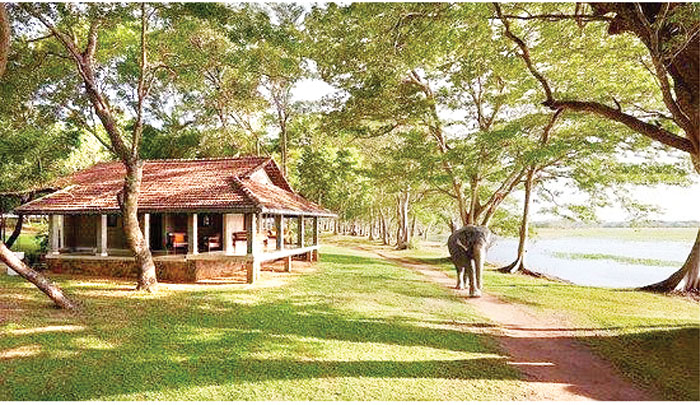
CONFESSIONS OF A GLOBAL GYPSY
Dr. Chandana (Chandi) Jayawardena DPhil
President – Chandi J. Associates Inc. Consulting, Canada
Founder & Administrator – Global Hospitality Forum
chandij@sympatico.ca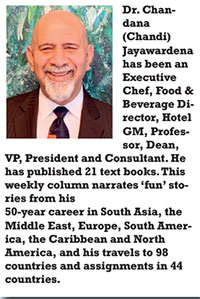
The Lodge and the Village are two, iconic resorts in the dry zone of Sri Lanka. In the Village, Architect Somaratna Silva had cleverly created a rustic resort with an open concept with individual rooms appearing like small houses in a remote village. Located in the centre of the resort are the front office, bar, restaurant, kitchens, stores and swimming pool. Recreational facilities, including elephant rides, boating, tennis etc., are located close by, facing the Habarana Lake. Even on extremely warm days, the open concept design of the two resorts ensured free circulation of breeze in a refreshing manner.
The greatest compliment the Village Habarana received was when competitors copied the concept and operated similar resorts. However, none were able to match the charm of the Village Habarana, and the innovative management style of the hotelier who opened it in 1976, my friend, boss and bestman, the late Bobby Adams.
Two young architects, trained by the best-known architect of Sri Lanka, legendary Geoffrey Bawa, continued the open concept in Habarana, but with more sophistication, when they created the concept for the Lodge. Architects Pheroze Choksy and Ismeth Rahim extended the concept of ‘Tropical Modernism’ – an architectural style of wide-open spaces connected to the sprawling outdoors made popular by Geoffrey Bawa.
The end result was simply a masterpiece of architecture, blending beautifully with nature, and the seamless delivery of world class hospitality. These architects working with the visionary board of directors of John Keells/Walkers Tours, had created two resorts, which were simply a delight for any hotelier to operate. I considered it a great honour for me to get an opportunity to manage both resorts concurrently.
Judging from its simple brand, first-time guests arriving at the Lodge usually did not have high expectations of standards. From the time they arrived, I could not help watching tourists become amazed with what they saw, the welcome they received, the service they experienced and the quality of public areas, gardens, bedrooms, food, etc. which always exceeded their expectations. Under-selling and over-delivering standards is a good strategy.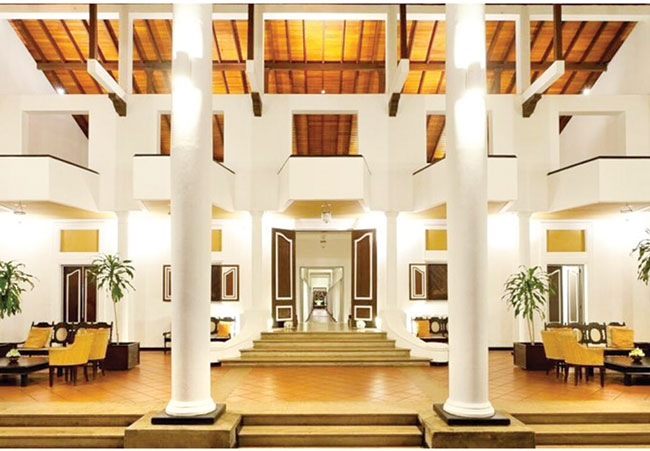
I was often amused to meet newly arrived guests with orchid flower garlands around their necks, wandering in the beautifully landscaped gardens holding their welcome cocktails served in King Coconuts. They would be looking up at the majestic pillars and seven, decorative balconies above the reception area, while refreshing their faces with the ice-cold, white towels we served them. “Wow” expressions were written all over their happy faces.
A large section of our employees was from the farmer communities around the resort complex. They were gentle and eager to provide ‘authentic Sri Lankan hospitality’ showcasing their best practices at homes and paddy fields. With a little training, their service delivery blossomed to outstanding levels.
Unprompted by management, the room attendants wished their guests ‘good night’ using wild flowers during the bed turn-down service. This thoughtful service was done while the guests were having their dinner. My wife and I were always touched with this beautiful daily gesture. Soon I realised that they even did the flower greetings in German, French, Italian etc., after checking the nationality of each guest with the front desk.
The birds provided continuous welcoming sounds in the Habarana Resort Complex. I often woke up early in the morning, long before my alarm rang, to the gentle chirping of exotic birds near our apartment. During my time in Habarana I learnt that Sri Lanka is home to 34 endemic bird species, and total number of bird species recorded in the island is nearly 500. With over 120 bird species, Habarana is widely considered to be a favoured location for bird watching in Sri Lanka.
Although Habarana is in the dry zone of Sri Lanka, which is always much warmer than the wet zone, the Habarana Resort Complex was relatively cooler. When the occasional rain showers that graced us, we had some challenges. In the 260 rooms of the complex, we had placed 520 large umbrellas for guests to use to move from individual rooms to the main building for meals.
I loved the rain in Habarana. Rain was also welcomed by over 2,000 trees located on our 40-acre land. It was peaceful and romantic. One evening, while walking from our cottage to the restaurant at the Lodge to have dinner, in the middle of heavy rainfall, my wife and I finally decided that after five years of married life and hectic global travels, now the time was right to start a family.
After successfully introducing sports tournaments for the staff, social events and training programs for supervisors and managers within the Habarana Resort Complex, our team got some new ideas. In addition to the Lodge and the Village, there were 13 smaller hotels in the North Central Province. “Can we do something to help these small hotels by pooling our resources?” one of our departmental managers asked during a brainstorming session.
Within a month, we formed a trade association which we termed ‘Rajarata Hoteliers Association.’ Based on the votes from the 15 member hotels, I was elected as the Founding President. We organized a monthly, best practice-sharing meeting and a get together of the managers of all 15 hotel. We also organized a monthly training session for the supervisors. Annually, we organized a large-scale sports festival for all of the staff.
One day I received a call from Mr. Jayantha Panabokka, the Managing Director of the Mahaweli Reach Hotel in Kandy. “Kandy hoteliers are hearing excellent reports about your association, Chandana. Can you please help us to form a similar trade association in Kandy?” So, I made a special trip to Kandy to share our best practices and the constitution. Later they formed the Kandy Hoteliers Association.
The largest professional association for hospitality managers in Sri Lanka was the Ceylon Hotel School Graduates Association (CHSGA). Having served CHSGA for four years from the late 1970s as the Treasurer and then as the General Secretary, I was very familiar with this body. Gradually a large number of senior members of CHSGA spoke with me, prompting me to become the President of CHSGA. With all this support, I was elected to this position uncontested in late 1985. My boss, Bobby Adams and the Chairman of John Keells Group, Mark Bostock fully supported me in these honorary contributions for the well-being of the industry.
As there were a few members of the CHSGA working at a nearby competitor hotel, Sigiriya Village, the Habarana Resort Complex had a special relationship with this resort. We shared best practices, coordinated room rate structure and regularly met their management team for recreational activities.
One of their managers, who was also a former student of mine at Ceylon Hotel School (CHS), Nimal Sangakkara, was a bodybuilder. We always targeted Nimal underwater because he was so strong. One day after a violent game of water polo, Nimal told me, “Sir, every time I come to Habarana to play water polo, I end up making an appointment for a post-game visit with the famous ayurvedic physician from Horuvilla who specializes on fractures and broken ribs!”
Unorthodox Management Development
A month before Christmas of 1985, Dave Kellaart, the manager in charge of food and beverage operations of the Village approached me with a personal request. He had worked as a waiter on my team at Havelock Tour Inn where I was the Assistant Manager in 1974. Dave was also one of my students at CHS in 1982, so I knew him well. I admired his ambition to succeed in the industry but when he asked me if I could let him leave the Village with just one week notice, I refused. It was very difficult to find managers at short notice to work in North Central Province or as some hoteliers called it, ‘in the jungle’.
“I have been offered the post of a Restaurant Manager at a five-star hotel in Dubai, with a salary six times higher than my current salary. They are demanding that I sign the contract now and join them next week. My family will benefit greatly from this offer. Can you please help me Sir?” Dave pleaded with me. After further thought I agreed, issued a good reference letter, released Dave on the same day and wished him every success.
I was happy to help my former student but now I had to find a replacement immediately, as we were in the middle of the high season for tourism. I brainstormed with the Executive Assistant Manager of the Village but we could not identify anyone suitable for the new vacancy among our 320 employees. While walking towards the front office of the Village, I was greeted by a young CHS trainee. “What is your name?” I asked him. “Anura Basnayake, I am doing my six-month industrial training in the front office,” he replied nervously.
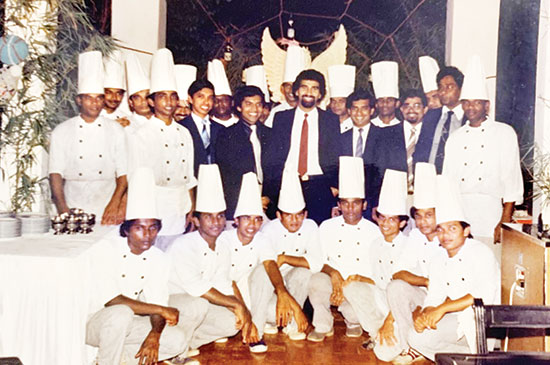
I had not spoken with Anura before but had regularly noticed him. He was always well-dressed, well-groomed, well-spoken, very polite and professional in dealing with guests. He created a good first impression. I asked the Front Office Manager, Krishna, to release Anura for thirty minutes for me to have a chat with him. I sat with Anura at the pool deck and asked him, “Have you done the CHS four-month basic program in Restaurant and Bar Service?” Anura said, “No Sir, I have only done two basic programs in Front Office Operations and Housekeeping.”
Within a few minutes, I determined that Anura had the potential of becoming a good hotelier. I told Anura that we needed a manager or supervisor for the restaurant for the very next day. Anura stopped talking and looked very scared. “I have never done any meal or beverage service in my life,” he said.
“No problem, I will train you personally with the ‘must know’ basic technical stuff. You have the right attitude and will be doing us a big favour by taking on this responsibility,” I said. As Anura looked very nervous and confused, I told him, “Look Anura, those who jump into the deep end when there is an opportunity will learn to swim quickly.”
Anura was appointed as the Trainee Restaurant Supervisor of the Village that evening. From that day, I spent an hour a day for a week privately with Anura training him one-on-one, about essentials on tray carrying, order taking, food service, menu knowledge, wines, liquor, cocktails, sales, bar controls and supervision. Anura acquired the skills very quickly and eventually specialized in food and beverage management in a five-star hotel. Today he is the Director/General Manager of a number of hotels in Kandy.
Recently when we reconnected and became Facebook friends, Anura sent me the following message: “After I left Ramada about 26 years ago, I joined Hotel Topaz and still continue to work there. You changed my career and it helped me to reach the highest position of the Food and Beverage Manager at Ramada. It’s a very long story, but in short, you told me in 1985, that ‘if your administration is right, you can do any job.’ To date, I tell this amazing career development story to all my subordinates. Thank you, Sir!”
A Bachelor’s Party with Mark Bostock
John Keells Group Chairman Mark Bostock and his wife loved visiting the Lodge and the Village. Mr. Bostock was a very nice man and a charismatic leader. He was also very particular about standards. One day, when I met him at the restaurant of the Lodge, during lunch service, He complained about an old stock of gin we had in the bar. He said, “Chandana, from my experience, that Red Spot Rawlings needs to be taken in about five tots if I want to go pretty blind! Please tell the central purchasing people at Keells to get you some decent Chelsea gin as soon as possible.”
I told Mr. Bostock that evening after dinner that the 18 managers will hold a ‘surprise’ bachelor’s party for Krishna, who would be getting married next week. “Where is the party being held?”, Mr. Bostock asked me and I said, “It will be at the lakeside cottage.” “Perfect, I love that cottage. If you don’t mind, I will join you guys at 9:00 pm, the Chairman said. “That’s great, Mark. I can finish reading my book peacefully after dinner,” Mrs. Bostock nodded with a smile.
Immediately, I called Anura and gave him a special assignment. “Call all the member hotels of Rajarata Hoteliers Association and find two bottles of Chelsea gin, on loan, within two hours.” Mr. Bostock was very impressed to see the Chelsea gin at the bachelor’s party. He liked quick action. He was in a jovial mood and narrated a number of funny rugby jokes and practical tips for married men!
“Wives always test what their newly married husbands can do well. Krishna, if you impress the wife, you will end up doing certain tasks during your entire married life. Therefore, be careful, not to impress your wife!”
When we asked for an example from the Chairman, he said, “Well, when we were about to go on our honeymoon, my wife delegated me to pack a suitcase. I immediately placed some muddy rugger boots right over some of her elegant, evening dresses. She was horrified but after that experience, over the last 35 years, my wife never asked me to pack a single suitcase again!”
1985 Christmas and New Year’s Eve
Christmas and New Year’s Eve celebrations at both resorts were held on a grander scale. I shared with the team my recently acquired experiences in five-star London hotels. The main changes were full entertainment packages in each resort and planning well in advance.
In addition to the resident band ‘Burn’, we contracted another band and entertainers from Colombo. By getting the Executive chefs and Food and Beverage manager/executive/supervisor to share their suggestions and plans with all 18 managers in the resort complex, I managed to create a friendly, competitive spirit among the two sister resorts.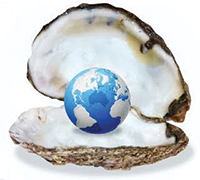
Some of the managers knew me well, long before my Habarana days. Two of them were my classmates from high school. Two of them were my contemporaries from CHS and two other managers had worked with me at previous hotels. While leading a large team, having previous “one-on-one” relationship with some of the team members is always helpful.
Features
Educational reforms under the NPP government

 When the National People’s Power won elections in 2024, there was much hope that the country’s education sector could be made better. Besides the promise of good governance and system change that the NPP offered, this hope was fuelled in part by the appointment of an academic who was at the forefront of the struggle to strengthen free public education and actively involved in the campaign for 6% of GDP for education, as the Minister of Education.
When the National People’s Power won elections in 2024, there was much hope that the country’s education sector could be made better. Besides the promise of good governance and system change that the NPP offered, this hope was fuelled in part by the appointment of an academic who was at the forefront of the struggle to strengthen free public education and actively involved in the campaign for 6% of GDP for education, as the Minister of Education.
Reforms in the education sector are underway including, a key encouraging move to mainstream vocational education as part of the school curriculum. There has been a marginal increase in budgetary allocations for education. New infrastructure facilities are to be introduced at some universities. The freeze on recruitment is slowly being lifted. However, there is much to be desired in the government’s performance for the past one year. Basic democratic values like rule of law, transparency and consultation, let alone far-reaching systemic changes, such as allocation of more funds for education, combating the neoliberal push towards privatisation and eradication of resource inequalities within the public university system, are not given due importance in the current approach to educational and institutional reforms. This edition of Kuppi Talk focuses on the general educational reforms and the institutional reforms required in the public university system.
General Educational Reforms
Any reform process – whether it is in education or any other area – needs to be shaped by public opinion. A country’s education sector should take into serious consideration the views of students, parents, teachers, educational administrators, associated unions, and the wider public in formulating the reforms. Especially after Aragalaya/Porattam, the country saw a significant political shift. Disillusionment with the traditional political elite mired in corruption, nepotism, racism and self-serving agendas, brought the NPP to power. In such a context, the expectation that any reforms should connect with the people, especially communities that have been systematically excluded from processes of policymaking and governance, is high.
Sadly, the general educational reforms, which are being implemented this year, emerged without much discussion on what recent political changes meant to the people and the education sector. Many felt that the new government should not have been hasty in introducing these reforms in 2026. The present state of affairs calls for self-introspection. As members affiliated to the National Institute of Education (NIE), we must acknowledge that we should have collectively insisted on more time for consultation, deliberations and review.
The government’s conflicts with the teachers’ unions over the extension of school hours, the History teachers’ opposition to the removal of History from the list of compulsory exam subjects for Grades 10 and 11, the discontent with regard to the increase in the number of subjects (now presented as modules) for Grade 6 classes could have been avoided, had there been adequate time spent on consultations.
Given the opposition to the current set of reforms, the government should keep engaging all concerned actors on changes that could be brought about in the coming years. Instead of adopting an intransigent position or ignoring mistakes made, the government and we, the members affiliated to NIE, need to keep the reform process alive, remain open to critique, and treat the latest policy framework, the exams and evaluation methods, and even the modules, as live documents that can be made better, based on constructive feedback and public opinion.
Philosophy and Content
As Ramya Kumar observed in the last edition of Kuppi Talk, there are many refreshing ideas included in the educational philosophy that appears in the latest version of the policy document on educational reforms. But, sadly, it was not possible for curriculum writers to reflect on how this policy could inform the actual content as many of the modules had been sent for printing even before the policy was released to the public. An extensive public discussion of the proposed educational vision would have helped those involved in designing the curriculum to prioritise subjects and disciplines that need to be given importance in a country that went through a protracted civil war and continue to face deep ethno-religious divisions.
While I appreciate the statement made by the Minister of Education, in Parliament, that the histories of minority communities will be included in the new curriculum, a wider public discussion might have pushed the government and NIE to allocate more time for subjects like the Second National Language and include History or a Social Science subject under the list of compulsory subjects. Now that a detailed policy document is in the public domain, there should be a serious conversation about how best the progressive aspects of its philosophy could be made to inform the actual content of the curriculum, its implementation and pedagogy in the future.
University Reforms
Another reform process where the government seems to be going headfirst is the amendments to the Universities Act. While laws need to be revisited and changes be made where required, the existent law should govern the way things are done until a new law comes into place. Recently, a circular was issued by the University Grants Commission (UGC) to halt the process of appointing Heads of Departments and Deans until the proposed amendments to the University Act come into effect. Such an intervention by the UGC is totalitarian and undermines the academic and institutional culture within the public university system and goes against the principle of rule of law.
There have been longstanding demands with regard to institutional reforms such as a transparent process in appointing council members to the public university system, reforms in the schemes of recruitment and selection processes for Vice Chancellor and academics, and the withdrawal of the circular banning teachers of law from practising, to name a few.
The need for a system where the evaluation of applicants for the post of Vice Chancellor cannot be manipulated by the Council members is strongly felt today, given the way some candidates have reportedly been marked up/down in an unfair manner for subjective criteria (e.g., leadership, integrity) in recent selection processes. Likewise, academic recruitment sometimes penalises scholars with inter-disciplinary backgrounds and compartmentalises knowledge within hermetically sealed boundaries. Rigid disciplinary specificities and ambiguities around terms such as ‘subject’ and ‘field’ in the recruitment scheme have been used to reject applicants with outstanding publications by those within the system who saw them as a threat to their positions. The government should work towards reforms in these areas, too, but through adequate deliberations and dialogue.
From Mindless Efficiency to Patient Deliberations
Given the seeming lack of interest on the part of the government to listen to public opinion, in 2026, academics, trade unions and students should be more active in their struggle for transparency and consultations. This struggle has to happen alongside our ongoing struggles for higher allocations for education, better infrastructure, increased recruitment and better work environment. Part of this struggle involves holding the NPP government, UGC, NIE, our universities and schools accountable.
The new year requires us to think about social justice and accountability in education in new ways, also in the light of the Ditwah catastrophe. The decision to cancel the third-term exams, delegating the authority to decide when to re-open affected schools to local educational bodies and Principals and not change the school hours in view of the difficulties caused by Ditwah are commendable moves. But there is much more that we have to do both in addressing the practical needs of the people affected by Ditwah and understanding the implications of this crisis to our framing of education as social justice.
To what extent is our educational policymaking aware of the special concerns of students, teachers and schools affected by Ditwah and other similar catastrophes? Do the authorities know enough about what these students, teachers and institutions expect via educational and institutional reforms? What steps have we taken to find out their priorities and their understanding of educational reforms at this critical juncture? What steps did we take in the past to consult communities that are prone to climate disasters? We should not shy away from decelerating the reform process, if that is what the present moment of climate crisis exacerbated by historical inequalities of class, gender, ethnicity and region in areas like Malaiyaham requires, especially in a situation where deliberations have been found lacking.
This piece calls for slowing-down as a counter practice, a decelerating move against mindless efficiency and speed demanded by neoliberal donor agencies during reform processes at the risk of public opinion, especially of those on the margins. Such framing can help us see openness, patience, accountability, humility and the will to self-introspect and self-correct as our guides in envisioning and implementing educational reforms in the new year and beyond.
(Mahendran Thiruvarangan is a Senior Lecturer attached to the Department of Linguistics & English at the University of Jaffna)
Kuppi is a politics and pedagogy happening on the margins of the lecture hall that parodies, subverts, and simultaneously reaffirms social hierarchies
by Mahendran Thiruvarangan
Features
Build trust through inclusion and consultation in the New Year

Looking back at the past year, the anxiety among influential sections of the population that the NPP government would destabilise the country has been dispelled. There was concern that the new government with its strong JVP leadership might not be respectful of private property in the Marxist tradition. These fears have not materialised. The government has made a smooth transition, with no upheavals and no breakdown of governance. This continuity deserves recognition. In general, smooth political transitions following decisive electoral change may be identified as early indicators of democratic consolidation rather than disruption.
Democratic legitimacy is strengthened when new governments respect inherited institutions rather than seek to dismantle them wholesale. On this score, the government’s first year has been positive. However, the challenges that the government faces are many. The government’s failure to appoint an Auditor General, coupled with its determination to push through nominees of its own choosing without accommodating objections from the opposition and civil society, reflects a deeper problem. The government’s position is that the Constitutional Council is making biased decisions when it rejects the president’s nominations to the position of Auditor General.
Many if not most of the government’s appointments to high positions of state have been drawn from a narrow base of ruling party members and associates. The government’s core entity, the JVP, has had a traditional voter base of no more than 5 percent. Limiting selection of top officials to its members or associates is a recipe for not getting the best. It leaves out a wide swathe of competent persons which is counterproductive to the national interest. Reliance on a narrow pool of party affiliated individuals for senior state appointments limits access to talent and expertise, though the government may have its own reasons.
The recent furor arising out of the Grade 6 children’s textbook having a weblink to a gay dating site appears to be an act of sabotage. Prime Minister (and Education Minister Harini Amarasuriya) has been unfairly and unreasonably targeted for attack by her political opponents. Governments that professionalise the civil service rather than politicise them have been more successful in sustaining reform in the longer term in keeping with the national interest. In Sri Lanka, officers of the state are not allowed to contest elections while in service (Establishment Code) which indicates that they cannot be linked to any party as they have to serve all.
Skilled Leadership
The government is also being subjected to criticism by the Opposition for promising much in its election manifesto and failing to deliver on those promises. In this regard, the NPP has been no different to the other political parties that contested those elections making extravagant promises. The problem is that the economic collapse of 2022 set the country back several years in terms of income and living standards. The economy regressed to the levels of 2018, which was not due to actions of the NPP. Even the most skilled leadership today cannot simply erase those lost years. The economy rebounded to around five percent growth in the past year, but this recovery now faces new problems following Cyclone Ditwah, which wiped out an estimated ten percent of national income.
In the aftermath of the cyclone, the country’s cause for shame lies with the political parties. Rather than coming together to support relief and recovery, many focused on assigning blame and scoring political points, as in the attacks on the prime minister, undermining public confidence in the state apparatus at a moment when trust was essential. Despite the politically motivated attacks by some, the government needs to stick to the path of inclusiveness in its approach to governance. The sustainability of policy change depends not only on electoral victory but on inclusive processes that are more likely to endure than those imposed by majorities.
Bipartisanship recognises that national rebuilding and reconciliation requires cooperation across political divides. It requires consultation with the opposition and with civil society. Opposition leader Sajith Premadasa has been generally reasonable and constructive in his approach. A broader view of bipartisanship is that it needs to extend beyond the mainstream opposition to include ethnic and religious minorities. The government’s commitment to equal rights and non-discrimination has had a positive impact. Visible racism has declined, and minorities report feeling physically safer than in the past. These gains should not be underestimated. However, deeper threats to ethnic harmony remain.
The government needs to do more to make national reconciliation practical and rooted in change on the ground rather than symbolic. Political power sharing is central to this task. Minority communities, particularly in the north and east, continue to feel excluded from national development. While they welcome visits and dialogue with national leaders, frustration grows when development promises remain confined to foundation stones and ceremonies. The construction of Buddhist temples in areas with no Buddhist population, justified on claims of historical precedent, is perceived as threatening rather than reconciliatory.
Wider Polity
The constitutionally mandated devolution framework provided by the Thirteenth Amendment remains the most viable mechanism for addressing minority grievances within a united country. It was mediated by India as a third party to the agreement. The long delayed provincial council elections need to be held without further postponement. Provincial council elections have not been held for seven years. This prolonged suspension undermines both democratic practice and minority confidence. International experience, whether in India and Switzerland, shows that decentralisation is most effective when regional institutions are electorally accountable and operational rather than dormant.
It is not sufficient to treat individuals as equal citizens in the abstract. Democratic equality also requires recognising communities as collective actors with legitimate interests. Power sharing allows communities to make decisions in areas where they form majorities, reducing alienation and strengthening national cohesion. The government’s first year in office saw it acknowledge many of these problems, but acknowledgment has not yet translated into action. Issues relating to missing persons, prolonged detention, land encroachment and the absence of provincial elections remain unresolved. Even in areas where reform has been attempted, such as the repeal of the Prevention of Terrorism Act, the proposed replacement legislation falls short of international human rights standards.
The New Year must be one in which these foundational issues are addressed decisively. If not, problems will fester, get worse and distract the government from engaging fully in the development process. Devolution through the Thirteenth Amendment and credible reconciliation mechanisms must move from rhetoric to implementation. It is reported that a resolution to appoint a select committee of parliament to look into and report on an electoral system under which the provincial council elections will be held will be taken up this week. Similarly, existing institutions such as the Office of Missing Persons and the Office of Reparations need to be empowered to function effectively, while a truth and reconciliation process must be established that commands public confidence.
Trust in institutions requires respect for constitutional processes, trust in society requires inclusive decision making, and trust across communities requires genuine power sharing and accountability. Economic recovery, disaster reconstruction, institutional integrity and ethnic reconciliation are not separate tasks but interlinked tests of democratic governance. The government needs to move beyond reliance on its core supporters and govern in a manner that draws in the wider polity. Its success here will determine not only the sustainability of its reforms but also the country’s prospects for long term stability and unity.
by Jehan Perera
Features
Not taking responsibility, lack of accountability

While agreeing wholeheartedly with most of the sentiments expressed by Dr Geewananda Gunawardhana in his piece “Pharmaceuticals, deaths, and work ethics” (The Island, 5th January), I must take exception to what he stated regarding corruption: “Enough has been said about corruption, and fortunately, the present government is making an effort to curb it. We must give them some time as only the government has changed, not the people”
With every change of government, we have witnessed the scenario of the incoming government going after the corrupt of the previous, punishing a few politicians in the process. This is nothing new. In fact, some governments have gone after high-ranking public servants, too, punishing them on very flimsy grounds. One of the main reasons, if not the main, of the unexpected massive victory at the polls of this government was the promise of eradication of corruption. Whilst claiming credit for convicting some errant politicians, even for cases that commenced before they came to power, how has the NPP government fared? If one considers corruption to be purely financial, then they have done well, so far. Well, even with previous governments they did not commence plundering the wealth of the nation in the first year!
I would argue that dishonesty, even refusal to take responsibility is corruption. Plucking out of retirement and giving plum jobs to those who canvassed key groups, in my opinion, is even worse corruption than some financial malpractices. There is no need to go into the details of Ranwala affairs as much has been written about but the way the government responded does not reassure anyone expecting and hoping for the NPP government to be corruption free.
One of the first important actions of the government was the election of Ranwala as the speaker. When his claimed doctorate was queried and he stepped down to find the certificate, why didn’t AKD give him a time limit to find it? When he could not substantiate obtaining a PhD, even after a year, why didn’t AKD insist that he resigns the parliamentary seat? Had such actions been taken then the NPP can claim credit that the party does not tolerate dishonesty. What an example are we setting for the youth?
Recent road traffic accident involving Ranwala brough to focus this lapse too, in addition to the laughable way the RTA was handled. The police officers investigating could not breathalyse him as they had run out of ‘balloons’ for the breathalyser! His blood and urine alcohol levels were done only after a safe period had elapsed. Not surprisingly, the results were normal! Honestly, does the government believe that anyone with an iota of intelligence would accept the explanation that these were lapses on the part of the police but not due to political interference?
The release of over 300 ‘red-tagged’ containers continues to remain a mystery. The deputy minister of shipping announced loudly that the ministry would take full responsibility but subsequently it turned out that customs is not under the purview of the ministry of shipping. Report on the affair is yet to see the light of day, the only thing that happened being the senior officer in customs that defended the government’s action being appointed the chief! Are these the actions of a government that came to power on the promise of eradication of corruption?
The new year dawned with another headache for the government that promised ‘system change.’ The most important educational reforms in our political history were those introduced by Dr CWW Kannangara which included free education and the establishment of central schools, etc. He did so after a comprehensive study lasting over six years, but the NPP government has been in a rush! Against the advice of many educationists that reforms should be brought after consultation, the government decided it could rush it on its own. It refuses to take responsibility when things go wrong. Heavens, things have started going wrong even before it started! Grade Six English Language module textbook gives a link to make e-buddies. When I clicked that link what I got was a site that stated: “Buddy, Bad Boys Club, Meet Gay Men for fun”!
Australia has already banned social media to children under 15 years and a recent survey showed that nearly two thirds of parents in the UK also favour such a ban but our minister of education wants children as young as ten years to join social media and have e-buddies!
Coming back to the aforesaid website, instead of an internal investigation to find out what went wrong, the Secretary to the Ministry of Education went to the CID. Of course, who is there in the CID? Shani of Ranjan Ramanayake tape fame! He will surely ‘fix’ someone for ‘sabotaging’ educational reforms! Can we say that the NPP government is less corrupt and any better than its predecessors?
by Dr Upul Wijayawardhana
-

 News22 hours ago
News22 hours agoBroad support emerges for Faiszer’s sweeping proposals on long- delayed divorce and personal law reforms
-

 News2 days ago
News2 days agoPrivate airline crew member nabbed with contraband gold
-

 News22 hours ago
News22 hours agoInterception of SL fishing craft by Seychelles: Trawler owners demand international investigation
-

 News4 days ago
News4 days agoHealth Minister sends letter of demand for one billion rupees in damages
-

 Opinion6 days ago
Opinion6 days agoRemembering Douglas Devananda on New Year’s Day 2026
-

 Features2 days ago
Features2 days agoPharmaceuticals, deaths, and work ethics
-

 News7 days ago
News7 days agoLeading the Nation’s Connectivity Recovery Amid Unprecedented Challenges
-

 Latest News2 days ago
Latest News2 days agoCurran, bowlers lead Desert Vipers to maiden ILT20 title











